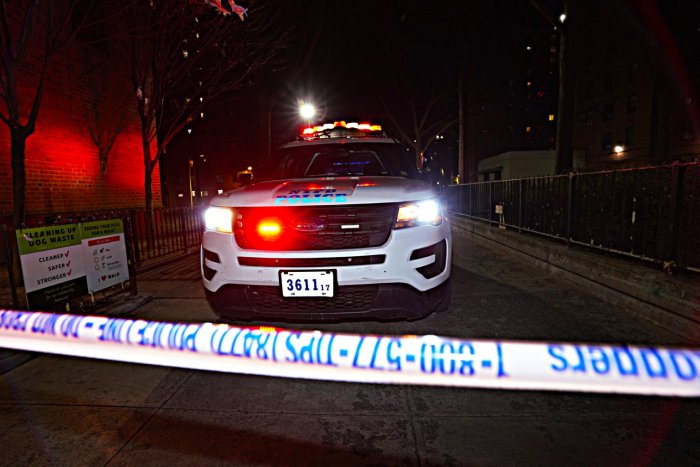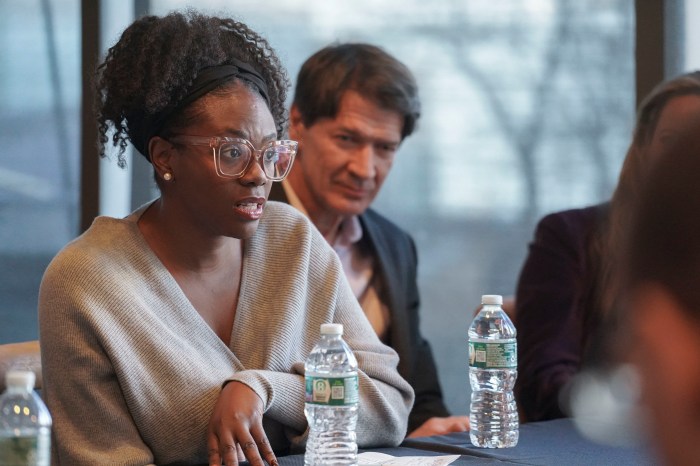By Courtney Dentch
City Councilman Leroy Comrie (D-St. Albans) is spearheading an effort in southeast Queens to make descendants of African slaves aware that they can seek reparations in a lawsuit naming U.S. corporations as defendants.
About 200 Queens residents were scheduled to attend a rally to discuss reparations this week, including a Millions for Reparations March in Washington in August and a lawsuit naming U.S. corporations as defendants.
The meeting at York College’s Performing Arts Center in Jamaica was to be hosted Tuesday night by Comrie and feature speeches by Councilmen James Sanders, Jr. (D-Laurelton) and Charles Barron (D-Brooklyn), Erica Ford, of the Code Foundation, and Viola Plummer, national coordinator of the December 12th Movement.
“This is an opportunity for people who want to have more information on the Reparations Movement to come out and learn about it,” Comrie said.
In addition to the movement itself, the meeting was designed to be a forum to discuss the Millions for Reparations March and national rally scheduled for Aug. 17 on Marcus Garvey’s birthday, Comrie said.
“People have been asking me whether or not to attend,” he said. “This hopefully will convince people whether to go or not go.”
Lawsuits were among the topics for discussion at the meeting Tuesday night, Comrie said.
Eight U.S. corporations were named as defendants in three lawsuits filed in March that demanded the companies pay reparations to the American descendants of African slaves on the grounds that the companies supported slavery or profited from it. One of the lawsuits, which was filed in federal court in Brooklyn, named insurer Aetna, the Fleet Boston financial services group and railroad operator CSX as defendants, the Associated Press reported. Other suits were filed in federal courts in New Jersey and Connecticut, reports said.
“They’re going to make their case and lay out their reasons why they think the lawsuit is winnable,” Comrie said of the discussion at the meeting.
The reparations lawsuit filed in Brooklyn seeks class-action status and an unspecified amount of damages, AP said at the time of the filing. The lawsuit also listed additional defendants as Corporate Does Nos. 1-1000, leaving room to add more companies, but Comrie said he was unsure if more defendants had been added since the filing.
“They feel that the companies that existed were aware that they were getting free or below minimum wage labor,” Comrie said. “It allowed them to develop the core nucleus for the company to profit. Those were the underpinnings for the success of the companies today.”
The suits came days after Queens residents joined African Americans across the city and the country on March 21 to celebrate the first nationwide Reparations Awareness Day. The day included a rally at Foley Square in Lower Manhattan in the afternoon and a larger forum in Brooklyn that night.
The struggle for reparations can be traced to the Emancipation Proclamation in 1863, when freed slaves were promised 40 acres of land and a mule to work it. But many freed slaves did not receive either, said Plummer, national coordinator of the December 12th Movement, a group that continues the civil rights work led by Malcolm X.
Racial disparities in statistics on crime, education or the economy stem from the slave trade, Plummer said.
“Just a fleeting glance at the current statistical data dealing with racial disparities in every aspect of our lives — employment, housing, health care, prisons, education, you name it. African people can be systematically be found at the bottom of the well,” she said in a statement in March.
The reparations movement is demanding payments be made to the descendants of African slaves by descendants of slave holders, Plummer said. The demands, however, are being addressed to the governments of the United States and European countries, she said.
“They owe us for centuries of exploitation,” Plummer said. “Reparations is not a question. It is a demand.”
Reach reporter Courtney Dentch by e-mail at TimesLedger@aol.com, or call 229-0300, Ext. 138.


































